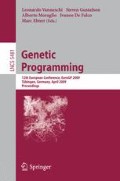Abstract
Coevolution often gives rise to counter-intuitive dynamics that defy our expectations. Here we suggest that much of the confusion surrounding coevolution results from imprecise notions of superiority and progress. In particular, we note that in the literature, three distinct notions of progress are implicitly lumped together: local progress (superior performance against current opponents), historical progress (superior performance against previous opponents) and global progress (superior performance against the entire opponent space). As a result, valid conditions for one type of progress are unduly assumed to lead to another. In particular, the confusion between historical and global progress is a case of a common error, namely using the training set as a test set. This error is prevalent among standard methods for coevolutionary analysis (CIAO, Master Tournament, Dominance Tournament, etc.) By clearly defining and distinguishing between different types of progress, we identify limitations with existing techniques and algorithms, address them, and generally facilitate discussion and understanding of coevolution. We conclude that the concepts proposed in this paper correspond to important aspects of the coevolutionary process.
Access this chapter
Tax calculation will be finalised at checkout
Purchases are for personal use only
Preview
Unable to display preview. Download preview PDF.
References
Axelrod, R.: The evolution of strategies in the iterated prisoner’s dilemma. In: Davis, L. (ed.) Genetic algorithms and simulated annealing, pp. 32–41. Morgan Kaufman, San Francisco (1987)
Hillis, W.: Co-evolving parasites improve simulated evolution as an optimization procedure. Physica D 42, 228–234 (1990)
Dawkins, R., Krebs, J.R.: Arms races between and within species. Procs of the Royal Society of London, Series B 205, 489–511 (1979)
Rosin, C.D., Belew, R.K.: Methods for competitive co-evolution: Finding opponents worth beating. In: Eshelman, L. (ed.) Procs. 6th ICGA. Morgan Kaufmann, San Francisco (1995)
Ficici, S.G.: Solution Concepts in Coevolutionary Algorithms. Ph.D thesis, Brandeis University (May 2004)
Ficici, S.G.: Monotonic solution concepts in coevolution. In: Procs. GECCO 2005. ACM Press, New York (2005)
Nolfi, S., Floreano, D.: Coevolving predator and prey robots: Do “arms races” arise in artificial evolution? Artificial Life 4(4), 311–335 (1998)
Stanley, K.O., Miikkulainen, R.: The dominance tournament method of monitoring progress in coevolution. In: Procs GECCO 2002 Workshops. Morgan Kaufmann, San Francisco (2002)
Ficici, S.G., Pollack, J.B.: Challenges in coevolutionary learning: arms-race dynamics, open-endedness, and medicocre stable states. In: Procs. ALIFE VI. MIT Press, Cambridge (1998)
Cliff, D., Miller, G.F.: Tracking the red queen: Measurements of adaptive progress in co-evolutionary simulations. In: Morán, F., Merelo, J.J., Moreno, A., Chacon, P. (eds.) ECAL 1995. LNCS (LNAI), vol. 929. Springer, Heidelberg (1995)
Cartlidge, J.: Rules of Engagement: Competitive Coevolutionary Dynamics in Computational Systems. Ph.D thesis, The University of Leeds (2004)
Miconi, T., Channon, A.: Analysing coevolution among artificial creatures. In: Talbi, E.-G., Liardet, P., Collet, P., Lutton, E., Schoenauer, M. (eds.) EA 2005. LNCS, vol. 3871, pp. 167–178. Springer, Heidelberg (2006)
Miconi, T.: The Road to Everywhere: Evolution, Complexity and Progress in Natural and Artificial Systems. Ph.D thesis, University of Birmingham (2007)
De Jong, E.D.: The MaxSolve algorithm for coevolution. In: Procs. GECCO 2005. ACM Press, New York (2005)
Author information
Authors and Affiliations
Editor information
Editors and Affiliations
Rights and permissions
Copyright information
© 2009 Springer-Verlag Berlin Heidelberg
About this paper
Cite this paper
Miconi, T. (2009). Why Coevolution Doesn’t “Work”: Superiority and Progress in Coevolution. In: Vanneschi, L., Gustafson, S., Moraglio, A., De Falco, I., Ebner, M. (eds) Genetic Programming. EuroGP 2009. Lecture Notes in Computer Science, vol 5481. Springer, Berlin, Heidelberg. https://doi.org/10.1007/978-3-642-01181-8_5
Download citation
DOI: https://doi.org/10.1007/978-3-642-01181-8_5
Publisher Name: Springer, Berlin, Heidelberg
Print ISBN: 978-3-642-01180-1
Online ISBN: 978-3-642-01181-8
eBook Packages: Computer ScienceComputer Science (R0)

